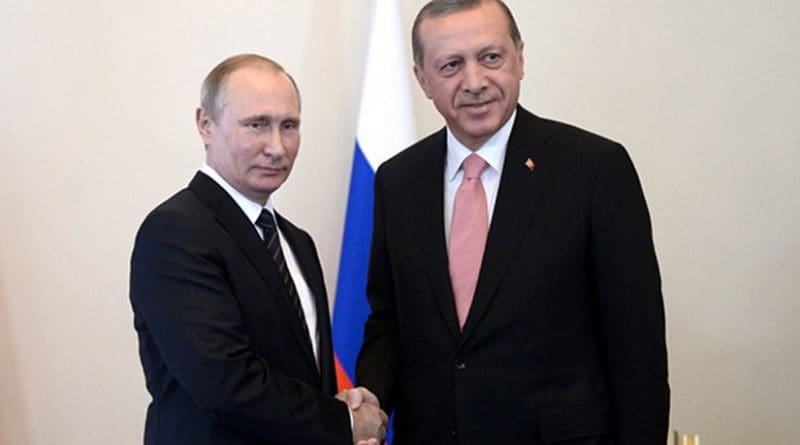Putin And Erdogan United By Their Common Enemies – OpEd
By Arab News
By Yossi Mekelberg*
Former British Prime Minister Winston Churchill once asserted that “in politics there are no permanent friends or enemies, only permanent interests.” If anyone wants evidence of that, they need look no further than the new missile deal between Russia and Turkey.
There is a touch of irony in that two years after Turkish warplanes shot down a Russian one on the Syrian border, the two countries signed a deal whereby Russia will supply Turkey with the advanced S-400 air defense system. In November 2015, when the warplanes incident took place, relations hit rock bottom, sparking deep animosity. Russian foreign minister Sergey Lavrov accused Turkey of a planned provocation; and at the height of the crisis Russian protesters attacked the Turkish embassy in Moscow, flights from Russia to Turkey were suspended and Turkish food imports were banned.
It took seven months for Turkey’s President Recep Tayyip Erdogan to acknowledge the severity of the rift with Moscow, and apologize. Nevertheless, relations have not entirely recovered. A major area of contention between Turkey and Russia revolves around their conflicting interests in Syria. They are on opposing sides in the Syrian conflict. Moscow has thrown its full backing behind Syria’s President Bashar Assad, while Ankara is supporting rebels who are fighting to topple the Syrian president and his regime. Turkey has also served as a staging ground for the Syrian opposition. Furthermore, the Kurds in Syria and how they affect the Kurdish question in Turkey are also factors in Ankara’s calculations.
Since the end of the Cold War there has always been a strong element of inconsistency and unpredictability in the relations between Russia and Turkey in political and economic spheres. In both, they simultaneously compete and cooperate with each other on a wide range of issues. Conflicting interests vis-a-vis ethno-religious issues in neighboring countries, transport routes for hydrocarbon energy, reliance on Russian natural gas, Moscow’s policies toward Iran or the supply of arms to Cyprus have all been major issues of contention. Russia on the other hand is concerned with Erdogan’s neo-Ottoman approach, and Russian-Turkish rivalry in the Black Sea and the Caucasus dates back centuries.
During the Cold War, Turkey was central to NATO’s strategy of containing the Soviet Union. It was at the forefront of securing the southern flank of this collective organization in face of potential Soviet aggression against the West. This danger had receded by the 1990s as a result of the disintegration of the Soviet Union and the decline of the country at its heart — Russia. The complex relations between Moscow and Ankara that have evolved since then must be seen in the context of both nations being ruled by leaders with ambitions for their countries to return to their past glory. Add to this two single-minded, populist presidents who are holding on to power for longer than it is healthy or desirable for any society, together with common and conflicting interests, and the picture of these uneasy, murky relations becomes somewhat clearer.
Erdogan’s announcement that the first down payment on the S-400 missile system had already been made to Russia was greeted with understandable apprehension and criticism in Europe and the US. It is almost the ultimate act of defiance by a NATO member, in times of rising tensions with a major rival. The Turkish president protests time and again that these are decisions “regarding our independence and we are obliged to take the necessary measures in defense and security.” For both military operational and especially political reasons, NATO perceives the Russian-Turkish arms deal as undermining the organization’s interests and proper functioning. It is a dangerous precedent for NATO, a serious crack in its unity, though one that has been in the making for some time.
Both Russia and Turkey are at a low point in their relations with the West. Sanctions were imposed on Russia following its annexation of Crimea and its instigation of an armed revolt in eastern Ukraine. Moscow’s interference with last year’s US presidential elections has cast a long shadow on relations with Washington. Turkey for its part is entangled in an ongoing feud with Germany, which suspended all major arms exports to Turkey due to the worsening human rights situation in that country and growing mutual animosity.
Erdogan recently interfered in the German elections, calling the main parties there enemies of Turkey who should be shunned by German-Turkish voters. This drew, as might be expected, an angry response from German leaders. Erdogan himself is still reeling from the German government’s refusal to allow his allies to campaign for him in Germany before the recent Turkish vote on extending his executive powers. Not a man to mince his words, keep his grudges to himself or bury the hatchet very quickly, he described this behavior as “Nazi-style.”
His suspicion of the West grew tremendously following the failed coup last year, for which he blamed the US-based Fethullah Gulen, accusing both the US and Germany of protecting Gulen and his supporters. Erdogan constantly complains about the refusal of the US and its allies to supply him with advanced military equipment such as drones. Thus his purchase of the S-400 system is not only an important strategic decision, but also represents a personal triumph.
For the US and the EU the newfound Putin-Erdogan intimacy is far from being a match made in heaven. However, both have their vulnerabilities in economic terms, regional rivalries and internal strife, and their act of defiance might encourage NATO to exploit these more persistently and more forcefully.
• Yossi Mekelberg is professor of international relations at Regent’s University London, where he is head of the International Relations and Social Sciences Program. He is also an associate fellow of the MENA Program at Chatham House. Twitter: @YMekelberg

